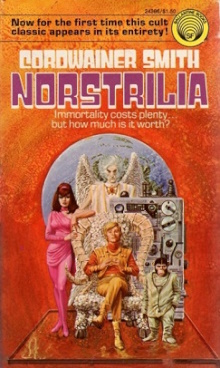Continuing on my tour of the greatest science-fiction novels ever written, here is Norstrilia, the only novel published by Cordwainer Smith. Smith is genuinely one of the greats of science-fiction and is mainly known for his short stories. His real life is arguably as fascinating as his fiction, being an East Asian scholar who called Sun Yat-Sen his godfather and an expert in psychological warfare who worked for the CIA. I found this book to be an impressive example of building a complete fictional future history setting and a incisive dissection of what it means to be human. Due to its characters and moral sensibility, I can’t say that I enjoyed it very much. It’s yet another book that really is a product of its time.
In Smith’s Instrumentality of Man setting far in the future, humanity has spread all across the galaxy and have physically changed in all kinds of ways to adapt to the different environments. On Earth itself, humans live long, comfortable and yet largely purposeless lives. Most real work is done by the underpeople, intelligent uplifted animal hybrids who don’t have rights. The main plot is about a citizen of the planet Norstrilia which is the shortened form of Old North Australia. The planet is the sole source of stroon, a longevity drug that extends the life of all humans. As a result, the Norstrilia is immensely rich, yet in order to maintain their way of life and unique identity, it imposes excessively high taxes on all imports. This means that life on the planet looks roughly like rural Australia despite their wealth and technology. A young man Rod McBan inherits a ranch that produces stroon. Due to the eugenics laws on the planet, there is some doubt as to whether he should be allowed to live as he lacks the telepathic abilities all adult citizens are supposed to possess. He also faces trouble in the form of an envious former friend who is now a government official. With the help of a computer, he executes a plan to get himself out of trouble, with the incidental effect of buying the entirety of the planet Earth itself with his wealth.
I don’t care much for the plot as the computer’s plan is every bit as preposterous as it sounds. It also doesn’t really matter as Rod McBan isn’t a character with much agency. The story has him take a trip from Norstrilia to Old Earth and experiencing adventures while older and more powerful people plan his trip every step of the way. He nominally owns the Earth, and that’s a great hook to draw readers in, but he is never allowed to actually exercise any power over Earth or its people. Still, it’s fun to read about the plans of criminals, politicians and revolutionaries to get their hands on his money and how his allies frustrate those plans. McBan grows up to become a man over the course of these adventures, though I found it icky that so much of his motivation is tied up around lusting after the sexy catgirl C’Mell who serves as his guide to Earth. The real point is for readers is to get a comprehensive view of this far future civilization which, while prosperous and safe, also feels sterile as true humans appear to live idle lives empty of meaning and purpose. The book’s point, that the animalistic underpeople are more human than true humans, is a bit too obvious for me but works well enough.
Smith’s expertise on a wide variety of subjects is easily discernible from the text. The complex series of financial transactions proposed by the computer to buy the Earth is insane but you can tell from the language used that Smith knows his stuff. The depth and intensity of emotions of the characters are conveyed through songs and poetry. I’m not a fan of this method of expression but I can appreciate how others might find them affecting. I do like that the Norstrilians insist on upholding their cultural identity yet Smith is practical enough to acknowledge that this entails the deployment of technology and massive military resources just out of sight. One of the key claims in this book is that delivering safety and fulfilling material needs alone aren’t enough to sustain a society. There needs to be something more. In the case of the Norstrillians it means using coercive measures to ensure that their culture remains unchanging. On Earth, the lords of the Instrumentality realize that they must reintroduce an element of chaos and risk to human lives. Given that Smith in real life was an expert in psychological warfare and helped the British during the Malayan Emergency and the Americans during the Korean Army, this is kind of chilling.
The fictional universe Smith created is an impressive feat of worldbuilding and I can see how it makes for a powerful and unique artistic vision. For my own part, I didn’t enjoy it as an adventure story. There’s a dichotomy between McBan’s, and by extension Smith himself, sympathy for the underpeople and how he ultimately is in favor of Old North Australia’s methods to defend its unique cultural identity. I think this reflects Smith’s own realpolitik and practical approach towards conflicts between nations and cultures. Smith’s assertion of what it truly means to be human doesn’t resonate with me either. It was worth my while to get this off my bucket list but I’m not a big fan of this book.
